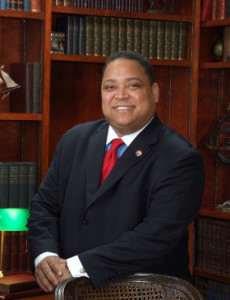Councilman Bond Introducing Resolution on U.S. Constitutional Amendment
(APN) ATLANTA — Atlanta City Councilman Michael Julian Bond (Post 1-at-large) plans to introduce a resolution calling for a 28th Amendment to the Constitution of the United States, at the Tuesday, September 02, 2014 Full Council Meeting.
The Constitutional Amendment, if adopted and ratified, would clarify that U.S. Congress has the authority to enact campaign contribution limits.
The resolution is a response to the recent Supreme Court rulings in the Citizens United v. Federal Elections Commission (FEC) and McCutcheon v. FEC cases.
As previously reported by Atlanta Progressive News, a national organization, Move to Amend, has been organizing a movement to amend the Constitution, since the Citizens United ruling in 2010. MTA has visited Atlanta twice.
Bond will introduce the resolution for immediate consideration during the final portion of the meeting. If there is majority support, it will pass. If there is not majority support, it could still be send to an appropriate committee for hearings.
“The government was founded to be the government for the people by the people. When you have an inference in our society that companies or corporations can, one, assume the role as people, and two, if you buy that argument and go a step further, that they can wield the same influence in our society that an individual can wield, that goes afoul of the very purpose of the founding of our country,” Bond told APN.
“We’re purporting to be a free, democratic society where every individual has same right as every other individual. A corporation isn’t that, in the common understanding of the common man,” Bond said.
“In a society where corporations can wield the same power it’s disturbing, it’s almost Orwellian,” Bond said.
“Having been in and around election politics since I was six years old, I’ve seen campaigns that have been flush with money. I’ve seen… where people put it together with gum, scotch tape, and toothpaste. It makes a tremendous difference the amount of money that is around in a race; you don’t want to give that power to corporations,” Bond said.
To date, 33 cities have passed Citizens Initiatives; seven cities have passed Initiative Referrals; and 276 municipal governments have passed resolutions in support of a constitutional amendment, including Savannah, Georgia, which did so on March 21, 2013.
The General Assemblies of Delaware, Illinois, and Vermont have passed resolutions asking Congress to adopt a constitutional amendment; and citizens of the State of Montana passed a voter initiative in support of the same.
Meanwhile, Senate Joint Resolution 19, “A joint resolution proposing an amendment to the Constitution of the United States relating to contributions and expenditures intended to affect elections,” has been introduced by U.S. Sen. Tom Udall (D-NM), and has 48 co-sponsors, including almost every Democratic Senator and two independents.
The Senate Judiciary Committee favorably reported the resolution on July 10, 2014.
CITIZENS UNITED AND MCCUTCHEON
On January 21, 2010, the Supreme Court, in a 5-4 ruling, in Citizens United v. the Federal Election Commission, struck down a provision of the the 2002 Bipartisan Campaign Reform Act (“McCain-Feingold Act”).
The provision at issue had prohibited corporations and unions from using their general treasury to fund “electioneering communications” (broadcast advertisements mentioning a candidate) within 30 days before a primary or 60 days before a general election.
The result of Citizens United has been to allow unlimited corporate and union spending to influence elections, through the advent of SuperPACs.
On May 05, 2014, the Supreme Court, in another 5-4 ruling, McCutcheon v. the Federal Election Commission, struck down Section 441 of the Federal Election Campaign Act.
Section 441 had set biennial aggregate campaign finance limits, where an individual could only give a limited total amount of money to any and all federal candidates, national political parties, or political action committees.
In the ruling, the majority held that the restrictions did not further the government’s interest in preventing quid pro quo corruption or the appearance of such corruption, while at the same time seriously restricted participation in the democratic process, and thus were invalid under the First Amendment.
CONSTITUTIONAL AMENDMENT
The text of the proposed Constitutional amendment is as follows:
Section 1.
Congress shall have power to regulate the raising and spending of money and in kind equivalents with respect to Federal elections, including through setting limits on
—
(1) the amount of contributions to candidates for nomination for election to, or for election to, Federal office; and
(2) the amount of expenditures that may be made by, in support of, or in opposition to such candidates.
Section 2.
A State shall have power to regulate the raising and spending of money and in kind equivalents with respect to State elections, including through setting limits on
—
(1) the amount of contributions to candidates for nomination for election to, or for election to, State office; and
(2) the amount of expenditures that may be made by, in support of, or in opposition to such candidates.
Section 3.
Congress shall have power to implement and enforce this article by appropriate legislation.
(END/2014)
